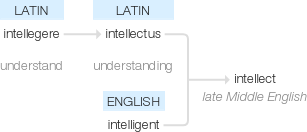Intellect
late Middle English: from Latin intellectus ‘understanding’, from intellegere ‘understand’ (see intelligent).
wiktionary
Borrowed from Late Latin intellēctus(“understanding, intellect”), perfect passive participle of Latin intellegō(“understand; reason”), from inter(“between, among”) + legō(“read”), with connotation of bind.
etymonline
intellect (n.)
"the sum of the cognitive facilities (except sense or sense and imagination), the capacity for reasoning truth," late 14c. (but little used before 16c.), from Old French intellect "intellectual capacity" (13c.), and directly from Latin intellectus "discernment, a perception, understanding," noun use of past participle of intelligere "to understand, discern" (see intelligence). The Latin word was used to translate Greek nous "mind, thought, intellect" in Aristotle.
